1 qt ans 1000 ml - Study guides, Class notes & Summaries
Looking for the best study guides, study notes and summaries about 1 qt ans 1000 ml? On this page you'll find 33 study documents about 1 qt ans 1000 ml.
Page 3 out of 33 results
Sort by

-
Relias ED RN A (Fall 2022) _ 67 Questions With CompleteSolutions
- Exam (elaborations) • 13 pages • 2022
-
- $15.49
- + learn more
Relias ED RN A (Fall 2022) _ 67 Questions With Complete SolutionsWhat is the current recommended dose of intravenous or intraosseous epinephrine in adult patients with cardiac arrest? 10 mg every 10 minutes 1 mg every 3-5 minutes 1 mg every 7 minutes 0.1 mg every 2 minutes Correct Ans 1 mg every 3-5 minutes A patient with a traumatic brain injury (TBI) is MOST likely to suffer from what condition? Diabetes mellitus Cerebral palsy Diabetes Insipidus Myxedema coma Correct Ans Diabetes...
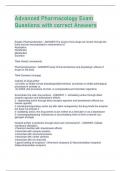
-
Advanced Pharmacology Exam Questions & Answers
- Exam (elaborations) • 42 pages • 2023
-
- $13.00
- + learn more
Advanced Pharmacology Exam Questions with correct Answers Explain Pharmacokinetics - ANSWER The study of how drugs are moved through the body and are encompassed in mechanisms of: Absorption Distribution Metabolism Excretion Think Kinetic (movement) Pharmacodynamics - ANSWER study of the biochemical and physiologic effects of drugs on the body Think Dynamic (change) majority of drugs either (a) mimic or inhibit normal physiological/biochemical processes or inhibit pathological processes in ...
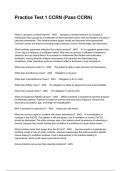
-
Practice Test 1 CCRN (Pass CCRN) Latest 2024 Questions And Answers
- Exam (elaborations) • 12 pages • 2024
-
- $13.39
- + learn more
Practice Test 1 CCRN (Pass CCRN) What is vasogenic cerebral edema? - ANS Vasogenic cerebral edema is an increase in extracellular fluid caused by a breakdown of the blood-brain barrier with the resultant increase in vascular permeability. This cerebral edema begins locally and becomes more generalized. Common causes are trauma (including surgical trauma), tumors, hemorrhage, and abscesses What ventilator parameter indicates fluid volume excess? - ANS An A:a gradient greater...
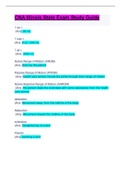
-
CNA Illinois State Exam Study Guide: Latest Updated
- Exam (elaborations) • 9 pages • 2023
- Available in package deal
-
- $7.99
- + learn more
1 oz = (Ans- 30 mL 1 cup = (Ans- 8 oz / 240 mL 1 qt = (Ans- 1000 mL Active Range of Motion (AROM) (Ans- done by the patient Passive Range of Motion (PROM) (Ans- health care worker moves the joints through their range of motion Active-Assistive Range of Motion (AAROM) (Ans- the person does the exercises with some assistance from the health care worker abduction (Ans- Movement away from the midline of the body Adduction (Ans- Movement toward the midline of the ...
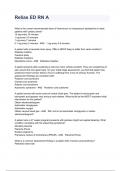
-
Relias ED RN A
- Exam (elaborations) • 12 pages • 2023
-
Available in package deal
-
- $9.49
- + learn more
Relias ED RN A What is the current recommended dose of intravenous or intraosseous epinephrine in adult patients with cardiac arrest? 10 mg every 10 minutes 1 mg every 3-5 minutes 1 mg every 7 minutes 0.1 mg every 2 minutes - ANS 1 mg every 3-5 minutes A patient with a traumatic brain injury (TBI) is MOST likely to suffer from what condition? Diabetes mellitus Cerebral palsy Diabetes Insipidus Myxedema coma - ANS Diabetes Insipidus A patient presents after sustaining a rol...
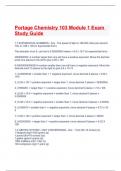
-
Portage Chemistry 103 Module 1 Exam Study Guide.
- Exam (elaborations) • 12 pages • 2023
-
- $16.49
- + learn more
1.1 EXPONENTIAL NUMBERS - Ans The speed of light is 186,000 miles per second. This is 1.86 x 105 (in exponential form) The diameter of an E. coli cell is 0. meters = 8.0 x 10-7 (in exponential form) 0. A number larger than one will have a positive exponent. Move the decimal point nine places to the left to give 4.95 x 109 0.00056 A number smaller than one will have a negative exponent. Move the decimal point 13 places to the right to give 5.6 x 10-13 1.) 0. = smaller than 1 = negat...
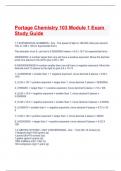
-
Portage Chemistry 103 Module 1 Exam Study Guide.
- Exam (elaborations) • 12 pages • 2023
-
- $18.49
- + learn more
1.1 EXPONENTIAL NUMBERS - Ans The speed of light is 186,000 miles per second. This is 1.86 x 105 (in exponential form) The diameter of an E. coli cell is 0. meters = 8.0 x 10-7 (in exponential form) 0. A number larger than one will have a positive exponent. Move the decimal point nine places to the left to give 4.95 x 109 0.00056 A number smaller than one will have a negative exponent. Move the decimal point 13 places to the right to give 5.6 x 10-13 1.) 0. = smaller than 1 = negat...
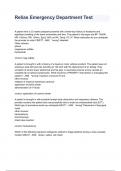
-
Relias Emergency Department Test
- Exam (elaborations) • 7 pages • 2023
-
Available in package deal
-
- $7.99
- + learn more
Relias Emergency Department Test A patient who is 32 weeks pregnant presents with a three-day history of headache and significant swelling of the lower extremities and face. The patient's vital signs are BP: 160/90, HR: 105/min, RR: 19/min, Spo2: 94% on RA, Temp: 97.3 F. What medication do you anticipate the provider to order FIRST? - ANS *wrong* labetalol Other choices: tylenol magnesium sulfate furosemide correct: mag sulfate A patient is brought in with a history of a head...
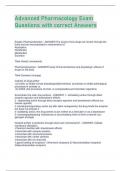
-
Advanced Pharmacology Exam Questions with correct Answers
- Exam (elaborations) • 42 pages • 2023
-
- $13.00
- + learn more
Advanced Pharmacology Exam Questions with correct Answers Explain Pharmacokinetics - ANSWER The study of how drugs are moved through the body and are encompassed in mechanisms of: Absorption Distribution Metabolism Excretion Think Kinetic (movement) Pharmacodynamics - ANSWER study of the biochemical and physiologic effects of drugs on the body Think Dynamic (change) majority of drugs either (a) mimic or inhibit normal physiological/biochemical processes or inhibit pathological processes in ...
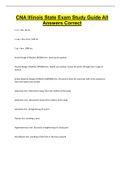
-
CNA Illinois State Exam Study Guide All Answers Correct
- Exam (elaborations) • 8 pages • 2023
-
- $9.19
- + learn more
CNA Illinois State Exam Study Guide All Answers Correct 1 oz = Ans- 30 mL 1 cup = Ans- 8 oz / 240 mL 1 qt = Ans- 1000 mL Active Range of Motion (AROM) Ans- done by the patient Passive Range of Motion (PROM) Ans- health care worker moves the joints through their range of motion Active-Assistive Range of Motion (AAROM) Ans- the person does the exercises with some assistance from the health care worker abduction Ans- Movement away from the midline of the body Adduction Ans- Movement t...

$6.50 for your textbook summary multiplied by 100 fellow students... Do the math: that's a lot of money! Don't be a thief of your own wallet and start uploading yours now. Discover all about earning on Stuvia


